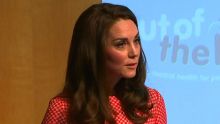Halfway through her HSC, Rachel Woolley was suffering exhaustion and a stiff neck.
"All my friends were tired, but it got to the point where I couldn't get upstairs," Ms Woolley said.
More World News Videos
Most cancer caused by DNA errors
Scientists in the US have published research showing that two-thirds of cancers are caused by DNA replication errors.
She saw six GPs before a doctor finally sent her for a CT scan.
"I knew something serious was happening and I spent that Tuesday night in hospital. I'd never been in hospital before."

Rachel was diagnosed with Hodgkin lymphoma, a cancer of the lymphatic system.
"It was just completely random," Ms Woolley said.
"You definitely go through a 'why me?' phase. What had I done?" she said.
Now 19, Ms Woolley is studying for her bachelor of music at the University of NSW. Despite the cancer coming back last year, she was given the all-clear again in January.
What triggered Ms Woolley's cancer is not known, but a landmark study published on Friday shows that about two-thirds of all cancers are caused by random errors made during normal cell division.
"Our research has broken the paradigm that most cancers are environmental or inherited," said Assistant Professor Cristian Tomasetti of the Johns Hopkins University school of medicine.
His study with Bert Vogelstein, published in Science, evaluated cancer occurrence in 69 countries, including Australia, covering 4.8 billion people.
Professor Vogelstein said: "Most of the time random mutations during cell division don't do any harm. That's good luck.
"Occasionally they occur in a cancer-driver gene. That's bad luck."
The study reviewed 32 types of cancer and found that about 66 per cent of cancer mutations result from random DNA copying errors, 29 per cent can be attributed to lifestyle or environmental factors and the remaining 5 per cent are inherited.

Comparative rates of cancer by heredity, random and environmental causes. Most cancers are caused by random errors in DNA replication during cell division. Photo: Science/Tomasetti
"Detecting cancers earlier can save lives regardless of what caused the mutation," Assistant Professor Tomasetti and Professor Vogelstein said in a statement. "More research to find better ways to detect cancers earlier is urgently needed."
The researchers are at pains to say that a cancer is very rarely caused by a single error in cell division, but is often a cumulative process, which is why cancers are more common in older people.
Professor David Thomas is head of the Garvan Institute's cancer division and director of the Kinghorn Cancer Centre.
"The first Vogelstein study in 2015 was important and heretical. Here they have got a much larger data set that expands to the entire globe.
"I'm not surprised at the ratios of random errors to to environmentally-induced mutations and hereditary causes. They seem about right."
However, Professor Thomas said that in his view some of the assumptions made in the modelling "are very rubbery", and there will be strong debate about the paper.
Despite his reservations, Professor Thomas said the paper is important: "I do think the broad balance is accurate."
The overall balance also matches the expectations of Professor Sanchia Aranda, chief executive of the Cancer Council.
"We already know that about one-third of cancers are preventable," she said. "Very few cancers are truly inherited."
Professor Thomas said just because most cancers are caused by random mutation, it doesn't mean environmental factors don't play a role.
"Even if the bulk of mutations are random, a cell needs to get to the final step to become malignant. Environment and heredity play a role here," he said.
Assistant Professor Tomasetti said: "Cancer rates vary widely by organ. If you look at lung cancer the concentration is in the environmental component.
"However, with brain cancers, bone cancers or childhood cancers the concentration is in the random component.
"That means virtually all the cancerous mutations are caused by simple mistakes caused by every cell when it divides."
Is this any comfort to Ms Woolley?
"One perspective is 'At least I didn't do anything wrong'," she said. "But you still feel 'Why me?'"
Professor Thomas said that while the study was important it won't change clinical practice.
"The fundamental advice we give as clinicians about how to manage and look out for cancer are not affected by this study.
"People should still try to minimise and manage their exposure to environmental or inherited risk factors."
While the study won't immediately impact clinical practice it could assist in the management of the psychological impacts of cancer.
Dr Pandora Patterson is general manager of research at CanTeen, the charity that supports young people living with cancer.
"People digest information in different ways, so it could be helpful to know 'This is not my fault, it's just random'," she said.
Ms Woolley is a member of CanTeen. "By talking to people who have been through all this you can learn stuff that the doctors don't tell you," she said.
"It's such a relief not feeling you're on your own. You can just sit around with people talking about life – people just get you."
Her message is that while going through treatment is "very shitty", things can get better. "It's really important to stay positive and look forward to the future."















